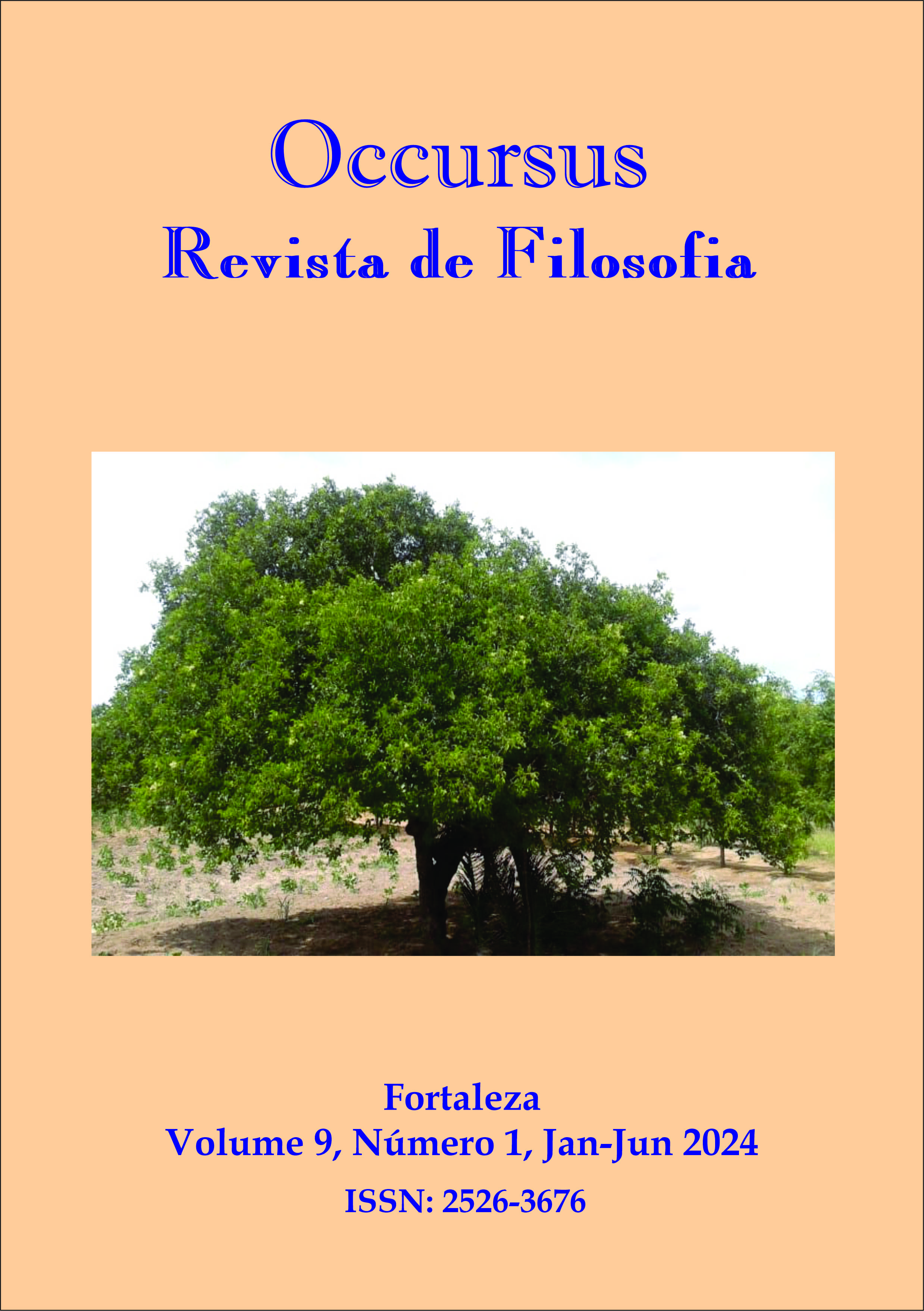Freud and the discovery of the unconscious:
about a narcissistic wound of humanity
DOI:
https://doi.org/10.52521/occursus.v9i1.12311Keywords:
Freud. Narcissistic Wounds. Unconscious. Psychoanalysis.Abstract
This article aims to examine the Freudian perspective on the narcissistic wounds that have shaken humanity and the relevance of the concept of the unconscious for understanding human psychic functioning. The key argument is that narcissistic wounds, resulting from scientific events that shook certainties that prevailed in humanity, have a profound impact on the individual's relationship with themselves and the world. To achieve this objective, the article adopts a theoretical approach, based on bibliographic research, using texts by Sigmund Freud as primary sources and works from psychoanalytic commentators as secondary sources. In conclusion, the article highlights the importance of considering not only the rational dimension of the human being, so defended by modern philosophy, but also the unconscious dimension, which does not function under the rules of rational consciousness. Therefore, a critical reflection is proposed on the influence of the unconscious and what Freud calls the third narcissistic wound of humanity, which dethrones rationality as the primordial element that responds for the human being.
References
BREUER, Josef. Freud, Sigmund. (1893). Sobre o mecanismo psíquico dos fenômenos histéricos: comunicação preliminar. In: Edição Standard brasileira das obras completas de Sigmund Freud. Rio de Janeiro: Imago, 1996. (Vol. II).
COSTA, J. F. O enigma do sujeito: o sujeito na psicanálise. São Paulo: Companhia das Letras, 2005.
DESCARTES, R. Discurso do Método. São Paulo: Martin Claret, 2006.
DESCARTES, R. Meditações metafísicas. Trad. Maria Ermantina Galvão. São Paulo: Martins Fontes, 2000.
FOCHESATTO, W. A cura pela fala. Estud. psicanal., Belo Horizonte. 36, p. 165- 171, dez. 2011.
FREUD, S. O inconsciente. In: Edição standard brasileira das obras psicológicas completas de Sigmund Freud. Rio de Janeiro: Imago Editora. 1987. (Vol. XIV).
FREUD, S. (1923) Dois verbetes de enciclopédia. Edição standard brasileira das obras psicológicas completas de Sigmund Freud. Rio de Janeiro: Imago, 1996. (vol. XVIII).
FREUD, S. O ego e o id. Tradução de Renato Zwick. São Paulo: Companhia das Letras, 2010.
FREUD, S. Inibições, sintomas e ansiedade. Edição standard brasileira das obras psicológicas completas de Sigmund Freud. Rio de Janeiro: Imago, 1987 (Vol. XX).
Freud, S. (1896). A etiologia da histeria. In: Edição Standard brasileira das obras completas de Sigmund Freud. Rio de Janeiro: Imago, 1996. (Vol. III).
FREUD, S. (1917). Uma dificuldade no caminho da psicanálise. In: Edição Standard brasileira das obras completas de Sigmund Freud. Rio de Janeiro: Imago, 1996. (Vol. XVII).
FREUD, S. (1940). Esboço de psicanálise. In: Edição Standard brasileira das obras completas de Sigmund Freud. Rio de Janeiro: Imago, 1996. (Vol. XXIII).
FREUD, S. (1912) Alguns Comentários sobre o Conceito de Inconsciente na Psicanálise. In: Obras completas de Sigmund Freud. Tradução de Luiz Alberto Hanns. Rio de Janeiro: Imago, 2004 (Vol. I).
GARCIA-ROZA, L. A. Freud e o inconsciente. 3. ed. Rio de Janeiro: Jorge Zahar, 2003.
GEEN, A. A vida, a morte e a psicanálise. Rio de Janeiro: Imago, 2011.
GIL, A. C. Como elaborar projetos de pesquisa. São Paulo, SP: Atlas, 2002.
LAPLANCHE, J. & PONTALIS, J. B. Vocabulário da psicanálise. São Paulo: Martins Fontes, 1969.
LAKATOS, E. M.; MARCONI, M. A. Fundamentos de Metodologia Científica. São Paulo, SP: Atlas, 2003.
MARQUES, J, Descartes e sua concepção de homem. São Paulo: Loyola, 1993.
RIBEIRO, C. V. Freud e o Methodenstreit: um debate a partir dos 'Seminários de Zollikon'. Diálogos Possíveis (FSBA). Salvador, v. 13, p. 97-123, 2014.
Downloads
Published
How to Cite
Issue
Section
License
Copyright (c) 1969 Ana Luiza Barbosa Caires, Caroline Vasconcelos

This work is licensed under a Creative Commons Attribution 4.0 International License.




